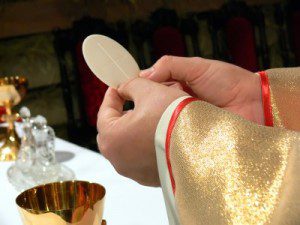 “At the Last Supper, on the night he was betrayed, our Savior instituted the Eucharistic sacrifice of his Body and Blood. This he did in order to perpetuate the sacrifice of the cross throughout the ages until he should come again, and so to entrust to his beloved Spouse, the Church, a memorial of his death and resurrection: a sacrament of love, a sign of unity, a bond of charity, a Paschal banquet ‘in which Christ is consumed, the mind is filled with grace, and a pledge of future glory is given to us.'” CCC 1323
“At the Last Supper, on the night he was betrayed, our Savior instituted the Eucharistic sacrifice of his Body and Blood. This he did in order to perpetuate the sacrifice of the cross throughout the ages until he should come again, and so to entrust to his beloved Spouse, the Church, a memorial of his death and resurrection: a sacrament of love, a sign of unity, a bond of charity, a Paschal banquet ‘in which Christ is consumed, the mind is filled with grace, and a pledge of future glory is given to us.'” CCC 1323
“The Eucharist is “the source and summit of the Christian life…” (CCC1324)
“The Sunday Eucharist is the foundation and confirmation of all Christian practice. For this reason the faithful are obliged to participate in the Eucharist on days of obligation, unless excused for a serious reason (for example, illness, the care of infants) or dispensed by their own pastor. Those who deliberately fail in this obligation commit a grave sin.” (CCC 2181)
Mass Schedule:
Please click on the link for “Mass Times” in either the left or right column for our respective parishes.
First Holy Communion
Please contact our parish office regarding First Holy Communion.
Holy Communion for the Sick and Home Bound
Please contact the parish office if you want to have Holy Communion brought to you.
The fast required before receiving Holy Communion
“A person who is to receive the Most Holy Eucharist is to abstain for at least one hour before holy communion from any food and drink, except for only water and medicine… The elderly, the infirm, and those who care for them can receive the Most Holy Eucharist even if they have eaten something within the preceding hour.” Can. 919
The obligation to receive Holy Communion at least once per year
“…each of the faithful is obliged to receive holy communion at least once a year (during the Easter season if at all possible).” Can. 920
The Eucharist in the Early Church (about 150 AD)
“ Let that be considered a valid Eucharist which is celebrated by the bishop, or by one whom he appoints. Wherever the bishop appears, let the people be there, just as wherever Jesus Christ is, there is the Catholic Church.” —St. Ignatius of Antioch, Letter to the Smyrnaeans, 8:1-2, AD 107
Who May Receive Holy Communion?
To receive Holy Communion at a Catholic Service, one must be a Catholic who is in full communion with the Catholic Church. These means one must:
- be regular in the practice of the sacraments,
- not be aware of having committed any unconfessed serious sin,
- not be persisting in unrepentant serious sin,
- accept the authority of the Pope and Bishops,
- accept all of the definitive teachings of the Church,
- not be in a marital situation that the Church cannot accept as valid,
- not be under any canonical penalty that would prevent one from receiving.
Please see the bishops’ Guidelines for Reception of Holy Communion
All are welcome to pray before the Eucharistic presence of our Lord, whether you are Catholic or not.
Grave sin requires confession before receiving Holy Communion
“A person who is conscious of grave sin is not to… receive the body of the Lord without previous sacramental confession unless there is a grave reason [i.e. danger of death] and there is no opportunity to confess; in this case the person is to remember the obligation to make an act of perfect contrition which includes the resolution of confessing as soon as possible.” Canon Law, 916
“Anyone who is aware of having committed a mortal sin must not receive Holy Communion, even if he experiences deep contrition, without having first received sacramental absolution, unless he has a grave reason for receiving Communion and there is no possibility of going to confession.” Catechism of the Catholic Church, 1457
Those unwilling to amend their life with regard to a grave sin should not receive (see above). If this grave sin is one that is commonly known (“manifest grave sin”), and the individual continues to receive after being told they should not, the priest should not admit them to Holy Communion, lest their reception cause scandal among the faithful.
“Those… (who are) persevering in manifest grave sin are not to be admitted to holy communion.” Canon Law, 915
Admitting them to Holy Communion can cause scandal because others are aware that they should not receive and may then follow their bad example of receiving Holy Communion when they are persisting in grave sin.
“Scandal is an attitude or behavior which leads another to do evil.” Catechism of the Catholic Church, 2284
How many times can you receive per day?
You can receive Holy communion up to two times per day, but the second time must be within the context of attending a full Mass (unless they are in danger of death). (see canons 917 & 921.2)
In danger of death
“The Christian faithful who are in danger of death from any cause are to be nourished by holy communion in the form of Viaticum (daily, if possible).” Can. 921
Those responsible for their care should be vigilant and not wait too long before making arrangement for them to receive Holy Communion so that they have the opportunity to receive while still fully conscious (See can. 922)
More about the Eucharist from the Catechism of the Catholic Church

